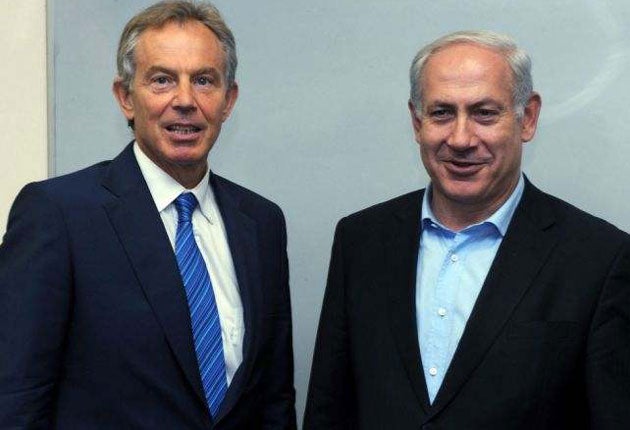Tony Blair: Former PM urges Israel to ease Gaza blockade
In his first interview since the attack, he tells Donald Macintyre that embargo risks alienating a generation

Your support helps us to tell the story
From reproductive rights to climate change to Big Tech, The Independent is on the ground when the story is developing. Whether it's investigating the financials of Elon Musk's pro-Trump PAC or producing our latest documentary, 'The A Word', which shines a light on the American women fighting for reproductive rights, we know how important it is to parse out the facts from the messaging.
At such a critical moment in US history, we need reporters on the ground. Your donation allows us to keep sending journalists to speak to both sides of the story.
The Independent is trusted by Americans across the entire political spectrum. And unlike many other quality news outlets, we choose not to lock Americans out of our reporting and analysis with paywalls. We believe quality journalism should be available to everyone, paid for by those who can afford it.
Your support makes all the difference.Tony Blair, the international community's Middle East envoy, yesterday issued his strongest call yet for an easing of the "counterproductive" blockade of Gaza as Israeli ministers met to consider relaxing the three-year-old embargo.
In his first newspaper interview since the Israeli navy halted a pro-Palestinian activist flotilla on Monday, Mr Blair called for a strategy for Gaza which "isolates the extremists and helps the people and not one that operates the other way round".
The inner "group of seven" senior Israeli ministers convened last night to discuss what a senior official called "alternative options" on Gaza which might allow more goods to enter the besieged territory provided they did not help its Hamas rulers to build up its military infrastructure.
The former British prime minister said Gaza would not become like the West Bank – which saw economic growth at 8.5 per cent last year – "because Hamas is in charge of it". But he told The Independent: "What is important is that we don't end up with people [in Gaza] losing hope for the future, alienating young people we don't need to alienate. Don't forget that 50 per cent of people in Gaza are under the age of 20 – and we don't want to kill the private sector in Gaza."
Mr Blair, who held separate meetings yesterday with both Israeli Prime Minister Benjamin Netanyahu and Defence Minister Ehud Barak, repeated his own and US Secretary of State Hillary Clinton's calls for a "prompt, impartial credible and transparent investigation" into the lethal boarding of the Mavi Marmara that cost nine lives.
He stressed more than once that the world needed to understand Israel's deep-seated security concerns and the fact that Gilad Shalit, who has been held for almost four years by Gaza militants, was a "huge issue" for the Israeli public. Mr Blair again called for Sgt Shalit's release.
He added that not enough international attention was paid to the fact that "the events that we see across TV screens are perceived completely differently in Israel, and people have got to understand that the pressure on Netanyahu in respect of Gaza from many quarters is to be tougher".
Mr Blair said this was why he had been telling Israeli leaders "that because Hamas will get whatever they want through the tunnels [carrying smuggled goods from Egypt] actually this is a counter-productive policy. You stop the legitimate goods coming in legitimately". Illegitimate imports – at black market prices – went through the tunnels, and "the weapons are coming in by the tunnels".
Mr Blair's remarks came after The New York Times yesterday quoted senior US officials as saying the Obama administration considered the blockade untenable and would press Israel for "another approach" that would ensure Israel's security while allowing more supplies into Gaza.
The US officials said the attack on the flotilla and the international condemnation created a new opportunity to push for increased engagement with the Palestinian Authority and a less harsh policy towards Gaza.
One option canvassed by international diplomats is for Turkey, countries allied to Israel or even the UN to send officially sanctioned vessels whose cargo would be subjected to strict inspection before dispatch.
Mr Blair said the captivity of Sgt Shalit and the fact that "Hamas as an entity is hostile" would be a "very difficult situation for any country". But he added: "I've been saying for the best part of two years [that] we need to find a way of helping people in Gaza to do things, both proper public services – sanitation, water, electricity – and legitimate business."
Mr Blair said the once-flourishing Gaza businessmen he met yesterday at the international Bethlehem conference on the Palestinian economy were "victims of the Hamas takeover, not supporters of it".
Earlier Foreign Minister Avigdor Lieberman became the first top Israeli Cabinet member to back proposals for an independent enquiry into the flotilla raid, saying the country had "no need to fear" an enquiry.
He added: "We have excellent jurists... one of whom will be willing to take it on himself, and if they want to include an international member of some sort in their committee that's alright too."
But Mr Netanyahu has yet to back the proposal, reportedly in part because of resistance from Mr Barak.
Hamas has turned away from Gaza a consignment of aid – including wheelchairs – transferred from the commandeered flotilla, partly on the grounds that it was incomplete, with Israel excluding construction materials like cement and piping from the original cargo.
Join our commenting forum
Join thought-provoking conversations, follow other Independent readers and see their replies
Comments